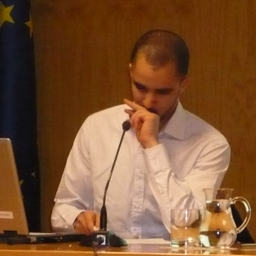
Elementy, w których Dr Abdelhadi Bellachhab uczestniczy
niedziela 5 czerwca, 2016
Inscrite à l’origine dans le cadre d’un projet ANR, « ANTIMOINE » , cette proposition de session suggère une vision novatrice des outils nécessaires à la constitution de savoirs relatifs aux activités humaines situées (anthropologie des territoires), savoirs élaborés à partir d'objets du patrimoine et de leur interprétation (lecture). Eu égard à la réalité caractérisant les systèmes d'informations patrimoniaux qui fonctionnent essentiellement à partir de mots-clés avec une prise en compte ...
Elementy, w których Dr Abdelhadi Bellachhab attends
piątek 3 czerwca, 2016
This forum will explore the current directions of critical heritage studies and what makes ACHS distinctive. Panel members will discuss what the term critical means to them, and what directions they would like to see develop in the future. To help develop an open dialogue, the session will also give considerable time to contributions from the audience.
Welcome addresses and cocktail, followed by the Concordia Signature Event "The Garden of the Grey Nuns". As the opening ceremony and cocktail take place in the former Grey Nuns' Motherhouse, recycled into campus residence and reading rooms by Concordia University, delegates will also have the possibility to discover the video Three Grey Nuns (3 minutes, by Ron Rudin and Phil Lichti. Three Grey Nuns recount their memories of communal life in the Grey Nun’s Motherhouse. Built...
sobota 4 czerwca, 2016
What if we changed our views on heritage? And if heritage has already changed? While, on the global scene, states maintain their leading role in the mobilization of social and territorial histories, on the local scale, regions, neighbourhoods and parishes have changed. Citizens and communities too: they latch on to heritage to express an unprecedented range of belongings that no law seems to be able to take measures to contain, often to the discontent of...
Most of what we experience as heritage emerges into conscious recognition through a complex mixture of political and ideological filters, including nationalism. In these processes, through a variety of devices (museums, scholarly research, consumer reproduction, etc.), dualistic classifications articulate a powerful hierarchy of value and significance. In particular, the tangible-intangible pair, given legitimacy by such international bodies as UNESCO, reproduces a selective ordering of cul...
niedziela 5 czerwca, 2016
"What does heritage change?" is a multifaceted question to which the answer(s) are in primary respects related to real-life negotiations among different groups of citizens, cultures, races, ethnic groups, sexual identities, and social classes about received, official and/or widely accepted or accomodated intangible attributes, cultural traditions, historic monuments, buildings, and other transmitted or revived historical legacies. Heritage designated by and for whom, for what motivations, an...







